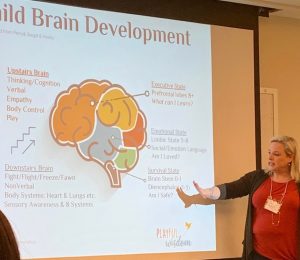Every March, Cary Hamilton’s Olympia Therapy clinic gets inundated with teenagers. The timing is no accident; it coincides with the preparation period for local high schools gearing up for International Baccalaureate and Advanced Placement tests. “They’re all stressed out, not sleeping and not eating,” says Hamilton, a licensed mental health counselor and child mental health specialist. “They’re completely overwhelmed.”

An unsettling statistic: according to the Center for Disease Control (CDC), suicide is the second leading cause of death for children over 10-years-old. Within Thurston County, that number exceeds the national average. “We are very high in suicide rates and self-harming rates,” says Hamilton. “We also have an extraordinarily high eating disorder population in our region.”
For parents and teens, learning to identify stressors and warning signs is critical, she notes, as well as taking proactive steps to support themselves and each other.
Sources of Stress
Lack of sleep. Developmentally, teens need over nine hours of sleep per night, but only 15 percent can afford that luxury. Between school, homework, jobs, and extracurricular activities, their plates are full, and sleep comes after.
Parental Expectations. “There’s so much pressure to figure out, ‘What’s next?’ ‘Where do I want to go?’ ‘What am I doing?’” says Hamilton. “That can lead to anxiety and depression. The kids I worry most about are the ones with families that are highly educated and doing very well. It’s the straight-A quarterback who’s doing National Honor Society or the valedictorian. They’re not acting out and they’re doing everything they’re supposed to, but they’re actually the ones who are hurting themselves the most. They feel like they have to be perfect.”

Silence Around Mental Health. Many teens feel ashamed of having anxiety or depression and don’t want to burden their parents by letting them know. Parent’s also assume their teen will talk to them, they don’t. Instead, they talk to each other. But while their peers may want to help, they’re unlikely to have the resources or information that a therapist would.
Social Media. Before the dawn of the Digital Age, bullying was mostly confined to the school day. Now, it can continue 24/7, says Hamilton, and many teens don’t know how to “turn off” from their electronic devices.
Overscheduling. Check a random teen’s weekly calendar and odds are you won’t see many blank spots. “They never have time to take a break,” says Hamilton. “They never have time to do things that are fun and involve the play aspect of rest. This leads to significant, biological and physiological stress, contributing to dysfunctioning brain-body connection.
Warning Signs
While stress, for all the reasons mentioned above, is an inherent part of growing up in modern America, particular behaviors can be warnings that a teen’s mental health has been compromised. The top things to watch for, according to Hamilton:
Change in eating habits. Olympia is one of just three cities in Washington, including Spokane and Seattle, which host The Emily Program, an eating disorder treatment center. “Teenagers tend to use food as the only thing they can control when they’re stressed out,” says Hamilton. “That’s usually the thing the parents pick up last because teens are good at hiding it.”
Change in sleep habits. This could mean either lack of sleep or wanting to sleep all the time.

Obsessive Worrying. “If you notice that a teen is always worried and talking about how they can never get everything done, that’s something to watch out for,” says Hamilton.
Withdrawal and isolation. Decreased amounts of time spent with peers and family is a common symptom of depression or anxiety. As is the absolute need to “have to be with friends.”
Irrational Anger. This shouldn’t be confused with anger that is proportional and justifiable, Hamilton warns. “It’s over the top anger and irritability that has no logic behind it,” she says. “It will feel like someone lit a match.”
To Be Preventative
Talk about it. Parents can worry that talking with their teens about issues like anxiety and depression may plant the seed for them to experience those conditions, says Hamilton, but actually it’s a relief. “They’re relieved to be seen and understood,” she explains.
Schedule regular check-ins. Have a coffee date with your teen once a week for half an hour somewhere out of the house and ask about how they’re doing. “Teenagers’ lives are so scheduled,” says Hamilton, “and they feel like they don’t want to stress their parents out by talking about any issues they’re having, but if that’s set up in advance, they know they’re going to have that opportunity where they’re seen 100 percent.” This develops a strong connection.
Turn off Wi-Fi/ban electronics in bedrooms. This one simple action may have a huge impact on the quality and amount of sleep. Turn the Wi-Fi off at the same hour on school nights, encouraging better time management and sleep patterns.
How to Get Treatment

If a teen has reached the point where outside help becomes necessary, finding a therapist might start with a visit to their primary care physician. “Doctors are much savvier at assessing and referring for mental health issues now,” says Hamilton.
In Washington State, the age of consent is 13-years-old, which means that if teens aren’t ready to inform their parents that they’re seeking help, they can still pursue it on their own. “Part of teenagedom is that you feel alone and that nobody’s like you,” says Hamilton. “By engaging with a therapist, teens realize, ‘I have confidentiality. This is actually pretty cool and safe.’”
If parents bring their teens to treatment, it’s important to let them see the doctor alone, she emphasizes. “Often times parents want to stick around with their teen in the doctor’s office,” she shares. “Fill them in on what your concerns are and then step out. Give them their privacy. They’re much more likely to be honest with their doctors that way. Showing them that you don’t need to know but care enough to get them there is really the most important thing.” Often a doctor will refer to Licensed Mental Health Professional, it can take time and some consultation to find the right fit for your teen. Support them during this process.
Learn more about Olympia Therapy by visiting the Olympia Therapy Website or by calling 360.357.2370.
Sponsored


















































